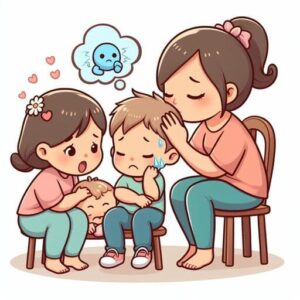Mental illness due to trauma
No healthway post selected for this post.
What is trauma?
Traumatic events are those that place you or someone close to you at risk of death or serious harm. Mental illness due to trauma can happen to anybody at any age. It affects anyone differently. Our usual ways of coping are staggered, leaving us feeling unsafe and frightened. We can be traumatized by:
-
one-off events like natural disaster, an accident, or violent attack
-
ongoing stress such as intimate partner or childhood abuse
-
bullying, a pandemic such as COVID-19 or long-term illness
-
living in an unsafe or unstable environment
-
seeing anyone else get hurt
How you are affected by trauma is not compared to how strong you are. Your reaction may depend on whether you’ve had past traumatic experiences, other kinds of stresses in your life and how much support you have thereafter.

Trauma and mental health statistics
-
According to the Substance Abuse and Mental Health Services Administration, around 61% of men and 51% of women record at least one traumatic event in their life-times. This would put trauma at the top of the list of most common mental illnesses.
-
Inthe US, about 90% of adults have faced a traumatic event once their life.
-
8 million people experience post-traumatic stress disorder at any given time.
-
Approximately 7-8% of all adults (1 in 13 people) will develop PTSD during their lifetime.
-
About 10% of women develop PTSD sometime during their lives compared to 4% of men.
Mental illness due to childhood trauma
Sometimes, mental illness is caused due to childhood trauma. According to a study in 2018 , there is a significant relation between childhood trauma and major psychiatric disorders such as, post-traumatic stress disorder (PTSD), borderline personality disorder, schizophrenia, bipolar disorder, and major depressive disorder.
Trauma disorders list
There are various types of mental illness due to trauma, all portrayed by the fact that some kind of trauma is an underlying cause. Trauma is a subjective experience, so while one incident may be easy for one person to deal with, it can be very traumatic for another person.
Examples of trauma include sexual assault, car accident, losing a loved one, neglect, abuse, or witnessing violence. The DSM-5 usually includes criteria for 5 distinct trauma and stress related disorders. Trauma disorders list may includes:
Post-traumatic stress disorder (PTSD)
PTSD is a disorder which develops after a traumatic experience, like being assaulted or witnessing a murder. It causes flashbacks, fear, nightmares, and avoidance of anything related to trauma. Post-traumatic stress disorder can cause major impairment in the life of a person.
Acute stress disorder (ASD)
ASD is much like PTSD, and it is also caused by trauma. The reaction to trauma in acute stress disorder is sudden and much reduced than in PTSD. It usually lasts between a few days and one month, on the other hand the symptoms of PTSD continue for more than a month.
Adjustment disorders (AD)
Adjustment disorders cause severe reactions to difficult or stressful experiences, like loss of a relationship or a death in the family. The stress in reaction to such a situation is greater than what would be predicted and shows a poor ability to cope.
There are six kinds of AD, each characterized by leading symptoms: depression, anxiety, anxiety and depression together, inappropriate behaviors, inappropriate behaviors along-with depression and anxiety, and unspecified.
Reactive attachment disorder (RAD)
RAD develops rarely but is seen in children who fail to grow a healthy attachment to a caregiver or parent. This occurs when the needs of a child aren’t met. This neglect is a kind of trauma. Babies or children with RAD may be sad, listless, withdrawn, afraid, and unengaged with others.
Disinhibited social engagement disorder (DSED)
Similar to reactive attachment disorder, this is an attachment disorder that commonly affects children who have been traumatized or otherwise neglected. The symptoms of DSED are less severe than RAD, but does make it difficult for a child to engage in an appropriate way or develop relationships.
Other unspecified trauma and stressor related disorders
A psychiatrist can diagnose someone as having unspecified disorders in this category if the individual has some but not all the symptoms of one of the particular conditions, or if there is not sufficient information to make a more precise diagnosis.
These are not the only mental illnesses due to trauma. Other conditions commonly seen as a result of traumatic experiences include:
-
Anxiety disorders
-
Depressive disorders
-
Substance use disorder
-
Dissociative disorders
-
Personality disorder

Trauma symptoms
The DSM-5-TR indicates remarkable features of disorders related to trauma include:
-
Dysphoria (unhappiness or general dissatisfaction)
-
Anhedonia (depleted ability to experience pleasure)
-
External aggression and anger
-
Dissociation (identity confusion, derealization, depersonalization, amnesia, and identity alteration)
Trauma symptoms are different across many mental health disorders. They are not limited to a couple of experiences. Other symptoms you might notice may include:
-
Fear
-
Sadness
-
Shame
-
Hypersensitivity or emotional numbness
-
Mood swings (emotional dysregulation)
-
Self-harm
-
Disordered eating
-
Compulsive behaviors
-
Sleep disturbance (restless sleep, insomnia, nightmares)
-
Misuse of substances
-
Chronic physical pain
-
Hallucinations or delusions related to trauma
-
Intrusive memories/thoughts
-
Idealization
-
Reexperiencing (flashbacks)
-
Avoidance
-
Social withdrawal
-
Reenacting
-
Hypervigilance
-
Muscle tension
-
Jumpiness
-
Cognitive distortions
Signs of emotional trauma in adults
Signs of emotional trauma in adults commonly include:
-
Mental health concerns
-
Emotional distress
-
Flashbacks and intrusive memories
-
Negative or extreme mood
-
Avoidance behaviors
-
Changes in eating habits
-
Cognitive changes
-
Feeling helpless
-
Feeling detached
-
Substance use
-
Relationship and trust issues
-
Chronic fatigue
-
Intense reactions
-
Hypervigilance
-
Trouble functioning
-
Hyperactivity
-
Physical reactions
-
Sleep disturbances
-
Social withdrawal
Effects of trauma on the body
Trauma affects body in several ways:
-
Continued obsession with the traumatic event
-
Adverse changes in mood and thinking
-
Anxiety
-
Depression
-
Fatigue
-
Irritability
-
Numbness
-
Sleep problems
-
Guilt
Treatment options for trauma-related disorders
If you are experiencing a trauma-related disorder, speaking with a mental health professional who specializes in trauma may help. Trauma-informed therapists can help with estimating the best psychotherapy approaches for your specific symptoms.
Commonly, cognitive behavioral therapy (CBT) is typically the primary method of treating disorders related to trauma. CBT can help you restructure the relationship between your emotions, thoughts, and behaviors.
Specific CBT therapies for mental illness due to trauma include:
-
Cognitive therapy (CT)
-
Trauma-focused cognitive behavioral therapy (TF-CBT)
-
Cognitive processing therapy (CPT)
-
Prolonged exposure therapy (PET)
Your therapist may also recommend supportive treatments, like:
-
Narrative exposure therapy (NET)
-
Eye movement desensitization and reprocessing therapy (EMDR)
-
Group therapy
-
Animal therapy
-
Supportive therapy
-
Medications for symptoms of anxiety and depression
Coping with mental illness due to trauma on a community level
Individual assistance is just one part of treating a few trauma-related disorders. Sometimes a trauma affects a community, such as with war or natural disasters.
Public health strategies that can also be a part of trauma-related disorder treatment may include:
-
Community recognition and awareness outreach
-
Creating educational and public training opportunities
-
Evolving community programs that bring various demographics together in a positive setting
Summary
Mental illnesses due to trauma are conditions that can be linked to traumatic experiences. They include adjustment disorder and PTSD and on a broader spectrum, conditions such as depression and anxiety disorders.
However, trauma is not limited to particular mental health conditions. It is an experience that leaves lasting effects that overlap, affecting mental as well as physical health.
No healthway post selected for this post.
